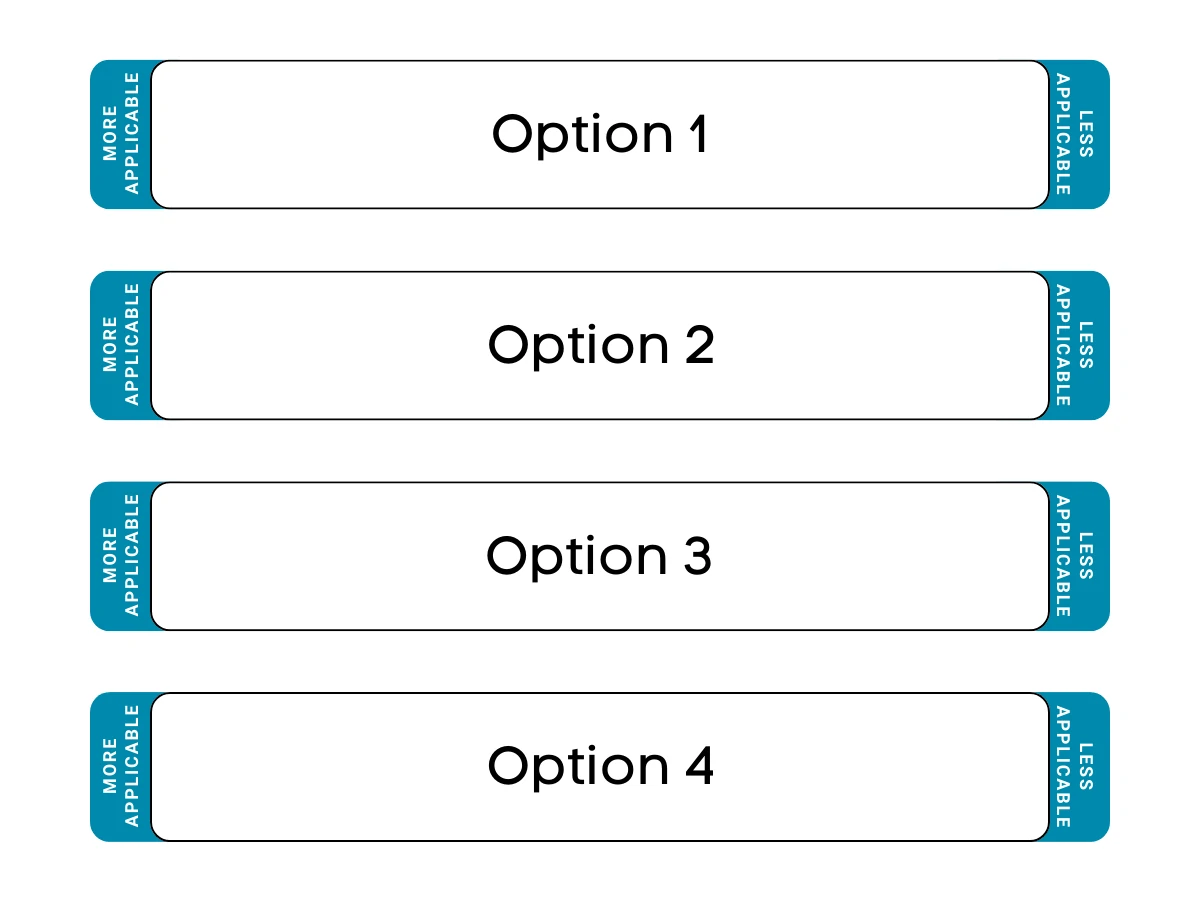Excel in the SHL Situational Judgment Test (2025) with the Help of Our Best Selling Prep Course
- Overview
- Curriculum
- Reviews
Decision-making and problem-solving skills are important in the workplace, and the SHL Situational Judgment Test (SJT) precisely tests these critical skills through real-life work scenarios. Job applicants and employees who excel in the SJT can have a profound impact on their career prospects and advancement opportunities. It showcases their ability to make sound judgments, handle complex situations, and effectively navigate team dynamics. Simultaneously, employers place significant trust in the SJT to identify candidates who possess the necessary skills and competencies to excel within their organizations. The SJT serves as a valuable assessment for employers to evaluate a candidate’s potential for success and contribution to the company.

SHL Personality & Behavioral Mastery
Last Updated: Apr 02, 2025
Course Content
 Introduction2 StepsBuy this Course: Get full access to all lessons, practice tests and guides.
Introduction2 StepsBuy this Course: Get full access to all lessons, practice tests and guides. Understanding OPQ2 StepsBuy this Course: Get full access to all lessons, practice tests and guides.
Understanding OPQ2 StepsBuy this Course: Get full access to all lessons, practice tests and guides. OPQ Score Ranges1 StepBuy this Course: Get full access to all lessons, practice tests and guides.
OPQ Score Ranges1 StepBuy this Course: Get full access to all lessons, practice tests and guides. Question Pattern & Strategies1 StepBuy this Course: Get full access to all lessons, practice tests and guides.
Question Pattern & Strategies1 StepBuy this Course: Get full access to all lessons, practice tests and guides. Practice Questions - OPQ3 StepsBuy this Course: Get full access to all lessons, practice tests and guides.
Practice Questions - OPQ3 StepsBuy this Course: Get full access to all lessons, practice tests and guides. Realistic Job Previews2 StepsBuy this Course: Get full access to all lessons, practice tests and guides.
Realistic Job Previews2 StepsBuy this Course: Get full access to all lessons, practice tests and guides. Practice Questions - RJP1 StepBuy this Course: Get full access to all lessons, practice tests and guides.
Practice Questions - RJP1 StepBuy this Course: Get full access to all lessons, practice tests and guides. SJT Overview1 StepBuy this Course: Get full access to all lessons, practice tests and guides.
SJT Overview1 StepBuy this Course: Get full access to all lessons, practice tests and guides. SJT Skills Assessed1 StepBuy this Course: Get full access to all lessons, practice tests and guides.
SJT Skills Assessed1 StepBuy this Course: Get full access to all lessons, practice tests and guides. SJT Test Format1 StepBuy this Course: Get full access to all lessons, practice tests and guides.
SJT Test Format1 StepBuy this Course: Get full access to all lessons, practice tests and guides. Sample Questions & Strategies1 StepBuy this Course: Get full access to all lessons, practice tests and guides.
Sample Questions & Strategies1 StepBuy this Course: Get full access to all lessons, practice tests and guides. Practice Questions - SJT2 StepsBuy this Course: Get full access to all lessons, practice tests and guides.
Practice Questions - SJT2 StepsBuy this Course: Get full access to all lessons, practice tests and guides.
Success Stories 4.5 540 Reviews





rob, 16 Jan
Solid review course that covers the…
Solid review course that covers the relevant topics in good detail





chad, 11 Jan
Great Program, amazing practice simulations
Easy to understand. Passed tests on first time thru.





QUEEN RIGHTEOUS, 07 Jan
Highly recommended.Great instructional…
Highly recommended.Great instructional information. I passed on the first try.





Rehan Ali, 06 Jan
The SHL Assessment was very helpful
The SHL Assessment was very helpful. The layout was great and everything was explained good. I passed the test and secured the job. My wife got me this course thanks to her and prepterminal 🙂





Mario Pacini, 21 Dec
I did the SHL Assessment prep and…
I did the SHL Assessment prep and managed to get comfortable with the test in less than 24hrs. Highly recommend this test.





Annonymous, 18 Dec
Course helped me pass SHL exam
Course helped me pass SHL exam. Highly recomended.
Understanding the SHL Situational Judgment Assessment
The SHL Situational Judgment Assessment is thoughtfully designed to assess your responses to work-related scenarios. It comprises a total of 44 questions, based on 11 workplace-related scenarios. Each scenario presents four options, resulting in a total of 44 questions to answer. For each option, you need to choose either the “More Effective” or “Less Effective” response based on your analysis of the scenario provided. While there is no time limit for the assessment, it is crucial to approach it with attentiveness since your answers cannot be changed once submitted.

Note: We have modified the choices to “More Applicable” and “Less Applicable” because they are more suitable for our statements.
SHL SJT Question Types
The questions in the SHL Situational Judgment Test (SJT) are mainly around “Behaviour” and “Experience at Work”. These questions are meant to evaluate your behavior, decision-making skills, and understanding of work-related situations.
Behavior at Work Scenarios
Scenarios in this context are designed to stimulate common work situations, allowing you to demonstrate your typical behavior and approach. The objective is to assess how you would respond and behave in these work-related contexts based on your inherent tendencies and preferred approaches.
For example, you may be presented with a scenario where a team member is struggling with a task, and you need to decide how to support them effectively. Your response will indicate your typical behavior and approach in such a situation, demonstrating your ability to handle challenges and work collaboratively.
Experience at Work Scenarios
Scenarios in this context aim to provide you with work-related situations that reflect real-world challenges. The objective of this section is to assess your experience and judgment in handling these scenarios based on your past work experiences.
For instance, you might be presented with a scenario where you need to prioritize multiple tasks with tight deadlines. Your response will reflect your experience and understanding of effective time management, organizational skills, and the ability to handle workload efficiently.
Scoring in SHL’s SJT
Scoring in SHL’s Situational Judgment Test (SJT) is based on their proprietary scientific methodology for evaluating behavior. While we can assist you in preparing for the SJT by providing similar practice questions, it is important to note that generating reports identical to SHL’s scoring system is not possible on our end.
SHL uses advanced assessment techniques to generate comprehensive reports that outline an individual’s behavioral strengths and areas for development. Their scoring process involves comparing responses to a normative group, considering the most effective and appropriate behaviors within specific work contexts.
It’s important to know that each employer may have their own unique criteria for selecting candidates based on behavior.
For example, one company may require a manager who has strong leadership skills, the ability to motivate a team, and excellent decision-making capabilities. Another company may prioritize candidates who exhibit effective communication, adaptability, and a collaborative approach.
SHL Situational Judgment Test Sample Questions & Answers
In order to enhance your comprehension of the SHL Situational Judgment Test (SJT), we have curated sample questions and answers that exemplify the types of scenarios you may face during the assessment.
Sample Scenario 1
You are a team leader in a busy call center, and one of your team members consistently struggles with meeting their daily targets. This has been an ongoing issue despite your previous efforts to provide guidance and support. How would you address this situation?
Options:
- Schedule a one-on-one meeting with the team member to discuss their challenges and develop an action plan for improvement.
- Assign the team member to a different role within the call center that aligns better with their skills and strengths.
- Increase monitoring and supervision of the team member’s performance to ensure they meet their targets.
- Ignore the performance issue and hope that the team member improves over time without intervention.
Best Approach (Solution)
Option A: More Applicable
Scheduling a one-on-one meeting with the team member to discuss their challenges and develop an action plan for improvement is the appropriate course of action. This option demonstrates proactive leadership by addressing the performance issue directly and providing support to help the team member overcome their challenges.
Option B: Less Applicable
Assigning the team member to a different role within the call center may not be the best solution. While it may be tempting to consider a different role, it is essential to first explore ways to improve the team member’s performance in their current role through coaching and development.
Option C: Less Applicable
Increasing monitoring and supervision of the team member’s performance may not be the most effective approach. While some level of monitoring and supervision is necessary, solely relying on this tactic may create a negative and stressful work environment, which can further hinder the team member’s performance.
Option D: Less Applicable
Ignoring the performance issue and hoping for improvement over time without intervention is not an appropriate response. It is essential for a team leader to actively address performance concerns and provide necessary support to help team members meet their targets.
Sample Scenario 2
You are a restaurant manager, and one of your skilled chefs has expressed dissatisfaction with their current role. They feel that their creativity is being stifled due to the repetitive nature of the menu. As a manager, you understand the importance of employee satisfaction and retaining talented staff. How would you handle this situation?
Options:
- Collaborate with the chef to introduce periodic specials or menu rotations that allow them to showcase their creativity.
- Provide opportunities for the chef to attend culinary workshops or training programs to expand their skills and knowledge.
- Initiate a discussion with the chef to understand their specific concerns and explore possibilities for internal transfers or promotions to roles that align better with their creative aspirations.
- Ignore the issue and hope it resolves itself.
Best Approach (Solution):
Option A: More Applicable
Collaborating with the chef to introduce periodic specials or menu rotations is a proactive approach to address their dissatisfaction. By providing opportunities for them to showcase their creativity, you can create a more engaging and fulfilling work environment while still maintaining the core menu.
Option B: More Applicable
Providing opportunities for the chef to attend culinary workshops or training programs can help them expand their skills and knowledge, allowing them to bring fresh ideas and techniques to the menu. This approach promotes continuous learning and professional development.
Option C: Less Applicable
While exploring internal transfers or promotions is important for career growth, it may not be the immediate solution to address the chef’s dissatisfaction. It is more effective to first find ways to enhance their creativity within their current role and assess if it resolves their concerns.
Option D: Less Applicable
Ignoring the issue and hoping for the issue to resolve itself without intervention is not a proactive approach. It can lead to further dissatisfaction in your employee. As a manager, it is essential to address the issues your employees face promptly and provide necessary support to help team members meet expectations.
Sample Scenario 3
You are a project manager leading a team in a technology company. The team is responsible for developing a new software application, and the project is nearing its critical phase. However, you notice that one of your key team members, who possesses essential technical expertise, is consistently arriving late to meetings and missing deadlines. This behavior is beginning to impact the overall project timeline and team morale. How would you address this situation?
Options:
- Ignore the issue and hope that the team member’s performance improves without intervention.
- Reassign the team member’s tasks to other members to ensure project deadlines are met without further delays.
- Implement stricter monitoring and supervision of the team member’s progress to ensure they adhere to project timelines.
- Hold a private meeting with the team member to discuss their lateness and missed deadlines, and offer support in addressing any challenges they may be facing.
Best Approach (Solution):
Option A: More Applicable
Ignoring the issue and hoping for improvement without intervention is not a proactive approach. It can lead to further delays, decreased team morale, and potential project failure. As a project manager, it is crucial to address performance issues promptly and provide the necessary support to help team members meet expectations.
Option B: Less Applicable
Reassigning the team member’s tasks to others may temporarily alleviate the impact on project deadlines, but it does not address the underlying issue. It is essential to address the team member’s lateness and missed deadlines directly to support their growth and ensure long-term project success.
Option C: Less Applicable
Implementing stricter monitoring and supervision may create additional stress and negatively impact team morale. While some level of monitoring is necessary, solely relying on this approach may not effectively address the root cause of the team member’s behavior.
Option D: More Applicable
Holding a private meeting with the team member to address their lateness and missed deadlines is the best approach. This allows you to have an open and supportive conversation to understand the underlying reasons behind their behavior. By offering support and assistance, you can identify any challenges they may be facing and work together to find solutions. This approach shows your commitment to the team member’s success and fosters an environment of trust and collaboration.
How our SHL Situational Judgement Prep Course Can Help
While situational judgment is inherently based on an individual’s behavior and cannot be directly altered by external influences, our SJT Prep Course is carefully designed to assist you in improving your scores in the SHL Situational Judgment Test by giving you different workplace related scenarios to practice. Here are the key features and benefits of taking our prep course:
Comprehensive coverage of test content and question types
Our course offers a comprehensive study guide that takes an in-depth look at the test content and familiarizes you with the various question types commonly found in the SJT. Through this guide, you will gain a solid understanding of the scenarios and challenges that are typically presented in the test.
Expertly designed practice exercises and mock tests
When it comes to the SJT test, different workplace scenarios truly matter, and we have got you covered. Our course provides a wide range of practice exercises and mock tests that faithfully simulate the actual exam conditions. These exercises are thoughtfully designed to mirror the complexity and diversity of real-life work situations.
Strategies and tips for answering situational judgment questions effectively
While it is not possible to directly change someone’s behavior, our course offers invaluable strategies and tips to empower you in approaching situational judgment questions with confidence and accuracy. Through our practice materials, you will learn how to skillfully analyze scenarios, identify the most suitable responses, and adeptly navigate through challenging dilemmas.
Detailed explanations for correct answers and common pitfalls
In our course, we go beyond simply explaining why you should choose a specific option in situational judgment questions. We provide comprehensive explanations for both the correct answers and why certain options should be avoided. By understanding the reasoning behind selecting the right option and the pitfalls of selecting the wrong ones, you will develop a deeper understanding of effective decision-making in work-related scenarios.
Frequently Asked Questions (FAQ’s)
While our mock tests aim to simulate the experience of the SHL Situational Judgment Test, it’s important to note that we do not provide reports identical to those generated by SHL. Our focus is on helping you practice and improve your performance through realistic test scenarios. However, our mock tests do offer valuable insights into your strengths and areas for improvement, allowing you to gauge your progress and adjust your preparation strategies accordingly.
While our course is designed to enhance your preparation and improve your performance in the SHL Situational Judgment Test, we cannot guarantee a specific score. The outcome of the test depends on various factors, including your individual abilities, prior experience, and effort put into studying. Our aim is to provide you with comprehensive study materials, expert guidance, and effective strategies to maximize your potential and increase your chances of success.
While our course aims to replicate the experience of the SHL Situational Judgment Test, we do not provide the exact interface as SHL. Our focus is on providing you with realistic practice materials and test scenarios that closely resemble the format and content of the SHL test.
Our questions are designed to simulate the actual test, although the functionality may vary from the SHL’s actual interface.We strive to offer a user-friendly and intuitive interface that allows you to navigate through the questions efficiently and effectively.

Created by: Tanoo Purohit
MSc - Clinical Psychology, Psychometric Tutor, Prepterminal Test Expert
973 students, 4.5, 540 Reviews
I’m Tanoo Purohit, with a BA honors and an MSc in Clinical Psychology from the renowned National Forensic Sciences University. Over seven years, I’ve studied the intricacies of the human psyche (as a part of my curriculum and practice). Proudly associated with PrepTerminal, I serve as a Psychometric Course Author and am recognized as a Psychological Test Expert. In every course I craft, I merge my expansive knowledge with relatable insights, ensuring that complex psychological concepts are presented with clarity and resonance for all learners. Feel free to contact me at [email protected].
